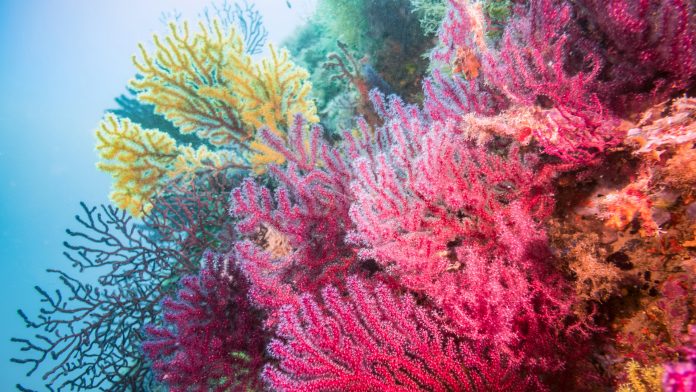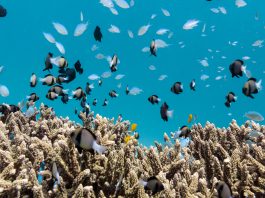A collaborative study has revealed that marine heatwaves are depleting the populations of coral in the Mediterranean.
What has this study revealed regarding Mediterranean coral?
The University of Barcelona’s two departments: The Biodiversity Research Institute (IRBio), and The Institute of Marine Sciences (ICM-CSIC), conducted a collaborative study investigating the Mediterranean coral populations.
The research team revealed that marine heatwaves associated with climate change is depleting the populations of coral in the Mediterranean by up to 90%. Scientists stress that this is concerning, because Mediterranean coral populations are essential for the functioning of the ecosystem, and is one of the most emblematic habitats in this particular sea.
However, these coral reefs could be unable to recover from the recurrent impact of these extreme episodes, as sea temperatures are rising, reaching, and maintaining dangerously high degrees for days and even weeks at a time.
Scientists assessed the long-term recovery capacity of two emblematic species of Mediterranean coral populations: the red gorgonian (or Paramuricea clavata) and the red coral (or Corallium rubrum).
This allowed the research team to observe the complex habitats that are essential for a great diversity of associated fauna, thus expanding the scientists’ fundamental understanding of their resilience regarding the more frequent and intense heatwaves.
What was discovered regarding ‘mass morality events?’
Climate change is severely impacting the marine ecosystems worldwide, including the Mediterranean. The marine heatwaves connected to the climate crisis is initiating mass mortality events in all the coastal ecosystems, and one of the species most impacted are the Mediterranean coral.
Knowledge regarding coral’s long-term resilience is still minimal, despite the extensive studies that examined the pressing impact of marine heatwaves on these organisms.
Scientists know that coral is a long-lived species, with some surviving for more than a hundred years in certain cases, and has slow populational dynamics, which means they are organisms with low growth and recruitment rates. Therefore, researchers require long temporary series (up to decades) to accurately assess their recovery capacity.
The research team analysed the results obtained through long-term monitoring of different coral populations impacted by great mass mortality from a heatwave in 2003 in the marine area of Scandola, France.
In particular, they analysed data on the state of these populations, and considered factors such as density, size, structure, and biomass. The data was collected during the following 15 years to the heatwave, by the MedRecover research group, which was formed by experts of the UB and ICM-CSIC, among other centres.
Scientists discovered that all of the investigated populations tended to collapse following the 2003 heatwave; 15 years after this event, the coral populations were considered to be extinct as they were no longer functional.
“We observed an average biomass loss regarding the initial biomass of 80% in populations of red gorgonian, and up to a 93% regarding the studied population of red coral,” noted Daniel Gómez, researcher at ICM-CSIC.
Joaquim Garrabou, also member of ICM-CSIC added: “These data are worrying for the conservation of these emblematic species, and it indicates that the effects of the climate crisis are speeding up with obvious consequences for the submarine landscapes, where the loss of coral equals the loss of trees in forests.”
What impact does recurrent heatwave exposure have on the coral populations?
Cristina Linares, professor at the Department of Evolutionary Biology, Ecology and Environmental Sciences of the Faculty of Biology and member of IRBio said, “we believe one of the main reasons why we observed these collapse trajectories is the potential recurrent exposure to heatwaves, incompatible with the slow populational dynamics of these species.”
In particular, their study period encompassed 2003-2018, and during this time they registered important heatwaves in at least four different years: 2009, 2016, 2017, 2018.
“During these heatwaves the temperature conditions in the studied area reached extreme levels which are incompatible with the life of these corals, which probably caused new mortality events to the decimated populations and made the recovery impossible,” explained Linares.
It is expected that the number and intensity of marine heatwaves will increase over the following decades due to climate change, the viability of many coral populations could be severely jeopardized.
The research team concluded: “However, there will probably be some areas in the Mediterranean in which, due to several factors, the recurrence of such climate impacts may be lower. This makes it especially relevant to keep —regarding other potential impacts— these climate refuges where the trajectories of coral populations could be more positive than those observed in this study.
“Nevertheless, there is an urgent need for stronger measures to be implemented against the climate crisis before the loss of biodiversity becomes irreplaceable.”









